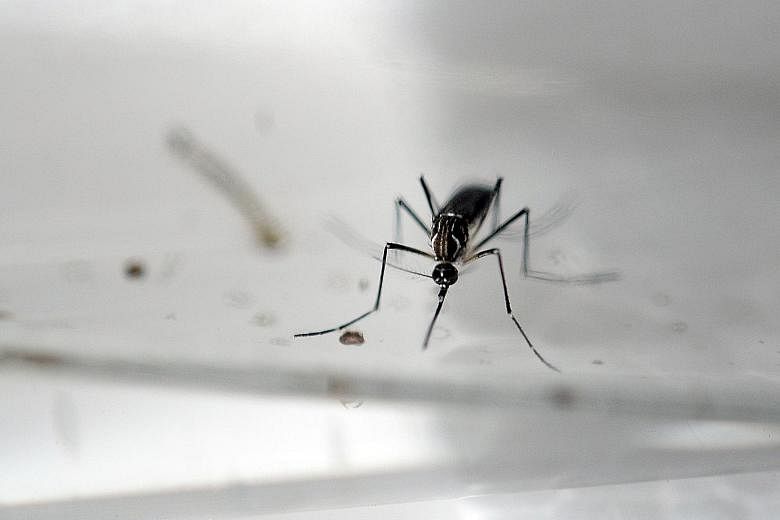Q Can mosquitoes be wiped out here?
A Mosquitoes are the world's deadliest creatures, killing more than 700,000 people a year.
But despite all efforts, it is unlikely that we will ever be able to eradicate them completely.
Singapore, for one, is known for its decades of tough vector control, but the insect has nonetheless prevailed.
According to entomologist Dr Hwang Wei Song of the Lee Kong Chian Natural History Museum, there are more than 3,500 mosquito species in the world. Over 100 species live in Singapore, most of which do not bite humans.
-
Why the Aedes is so hardy
-
Singapore has been trying to control the Aedes aegypti mosquito population for decades but the insect responsible for more than half a million deaths globally every year is still lurking around homes and construction sites. Here's a look at what makes the species so hardy:
EGGS CAN LIE DORMANT
The eggs of the Aedes aegypti mosquito can lie dormant for up to about nine months in dry conditions, according to the National Environment Agency (NEA). They can hatch after that if exposed to favourable conditions. The mosquito can produce about 100 eggs at a time and lays eggs about three times in its lifetime.
According to the US Centres for Disease Control and Prevention, the mosquitoes can "rapidly bounce back" to their original numbers despite vector control efforts. Moreover, the eggs "stick to containers like glue" and remain attached until they are scrubbed off.
BREEDS IN DIFFERENT HABITATS
Known as a "container breeding mosquito", the Aedes aegypti can lay eggs in man-made containers. It can also breed in stagnant water found in crevices of trees, stagnant pools of water in containers and even in vases filled with rocks.
WARMER WEATHER
While it is hard to predict exactly how climate change will affect mosquito populations and the spread of diseases, it is said that warmer conditions support faster breeding and maturation cycles of the Aedes mosquitoes.
Earlier this year, the NEA warned that the number of dengue cases may exceed 30,000 - a new record.
Carolyn Khew
Efforts here have mostly been aimed at reducing the Aedes aegypti mosquitoes, which can carry the dengue and Zika viruses.
The National Environment Agency has led one of the most successful dengue mosquito control programmes, said Dr Hwang.
"Yet, we still cannot totally eradicate all mosquitoes because it is quite frankly an impossible task," he said.
Aedes aegypti breed extremely fast in very small pockets of standing water and are very difficult to find, he explained.
Technology like genetically modified mosquitoes and mosquitoes infected with Wolbachia bacteria, which causes females to lay sterile eggs, however, have the potential to control the Aedes aegypti.
Assistant Professor Roman Carrasco from the National University of Singapore's biological sciences department said that experimental models show that with these techniques, it is feasible, in theory, to decimate the species and to do it relatively fast.
"We would need to release several times more sterile male mosquitoes than the native population and maintain this release level for a couple of years, then continue at a lower frequency to prevent the species from bouncing back," said Prof Carrasco.
"The problem is that these new technologies are still not well tested. So we have to check that everything is fine before they can be scaled up for area-wide elimination."
But even if we could wipe mozzies out, would we really want to? Toying with nature could bring with it unforeseen consequences, and it is not known what the ecological impact would be if all mosquitoes were to disappear from the face of the earth.
Not all mosquitoes are harmful and some play a key role in the food chain as food for animals such as frogs and lizards. Their larvae are also important food sources for fish.
Carolyn Khew

ASK US A QUESTION
E-mail us at askST@sph.com.sg


